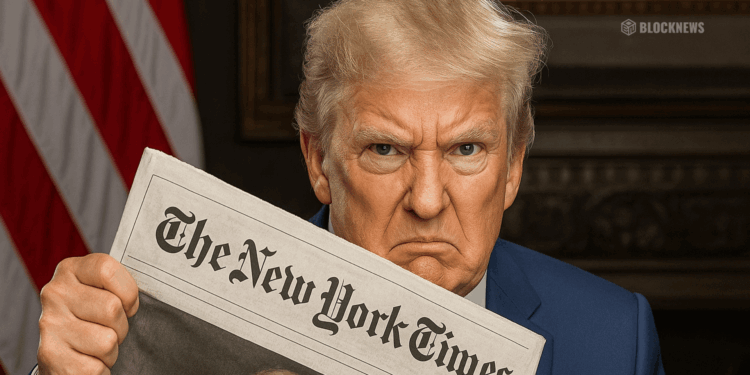- Trump is suing the New York Times and Penguin Random House for $15 billion over defamation and libel.
- The case builds on a pattern of billion-dollar lawsuits Trump has filed against major media outlets.
- Legal experts say the lawsuit faces steep hurdles due to the high bar for proving “actual malice” in U.S. defamation law.
Donald Trump has launched yet another legal battle, this time targeting the New York Times and publishing giant Penguin Random House. Filed in a Florida court, the lawsuit seeks at least $15 billion in damages, accusing both outlets of defamation and libel. According to Trump’s legal team, a series of articles and a 2024 book, Lucky Loser: How Donald Trump Squandered His Father’s Fortune and Created the Illusion of Success, inflicted severe harm on his business empire and personal reputation. Trump claims these works were published with full knowledge that they contained falsehoods, distortions, and attacks aimed at destroying his image.
A Pattern of Billion-Dollar Lawsuits
The lawsuit isn’t isolated—it follows a string of high-profile clashes Trump has had with major media players during his second term. Earlier this year, he hit the Wall Street Journal and Rupert Murdoch with a $10 billion suit, while Paramount opted to settle after being accused of deceptively editing a 60 Minutes interview with Kamala Harris. Trump’s legal filings argue that defamatory reporting has caused not just reputational harm but also tangible financial damage, pointing to steep drops in the stock price of Trump Media and Technology Group as evidence of the economic fallout.
NYT Pushes Back Hard
The New York Times has already pushed back, calling the lawsuit baseless and insisting it lacks any real legal foundation. A spokesperson said the paper would not be intimidated, emphasizing its commitment to fact-driven reporting and the protection of First Amendment rights. Penguin Random House, meanwhile, has remained quiet in response to the escalating legal storm. Legal experts note that Trump faces an uphill battle since U.S. defamation law requires public figures to prove “actual malice”—that statements were knowingly false or made with reckless disregard for the truth. This bar, set by the landmark New York Times v. Sullivan case in 1964, has been one Trump has frequently criticized as too protective of journalists.
What This Means Going Forward
On Truth Social, Trump framed the lawsuit as a defense not just of himself but of the broader America First and MAGA movements, claiming the media has long targeted him, his family, and his allies. Whether this case gains traction in court remains uncertain, but it underscores Trump’s continued willingness to wage billion-dollar fights against news organizations he accuses of spreading lies. The stakes are massive—not just for Trump’s legacy and financial empire, but for press freedom in the U.S., as the courts once again weigh the balance between free expression and reputational harm.














